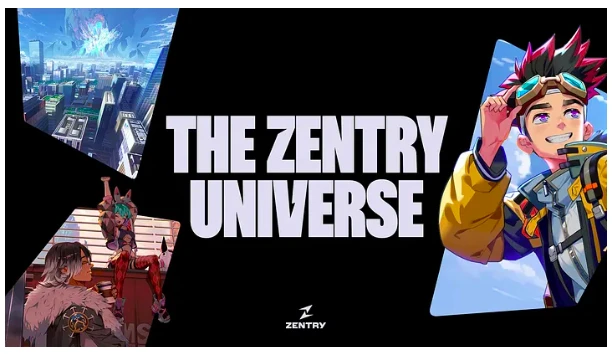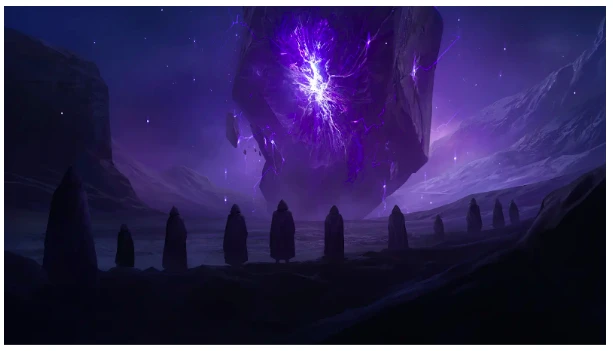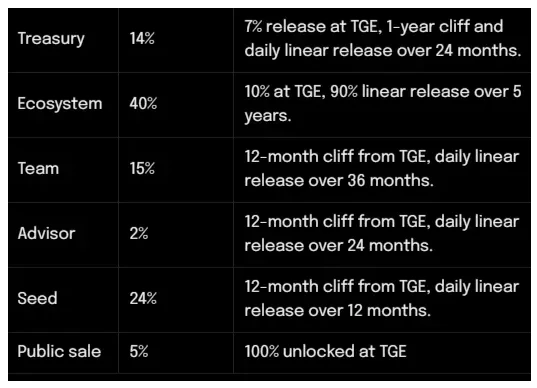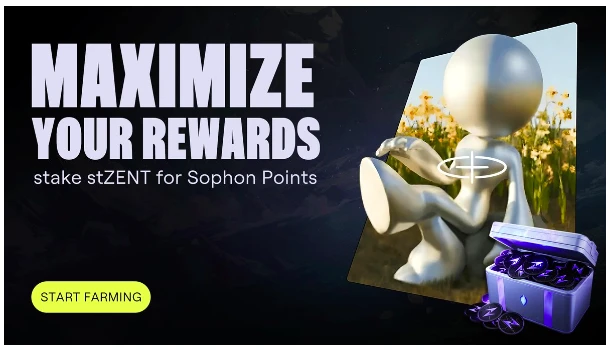Original source: blocmates
In the Web3 field full of innovation and opportunities, Zentry, an open gaming universe connecting Web2 and Web3, is committed to creating a unique ecosystem that seamlessly integrates traditional games and blockchain technology to provide players with a brand new gaming experience.
GuildFi is making a strong comeback and has fully upgraded its brand to Zentry.
This is not just a normal rebranding, or changing the name and logo to get a new roadmap and increase the price of the coin. This is a disruptive transformation of a project, combining the previous advantages with a whole set of new products and features, making Zentry not only the core position of Web3 games, but also a bridge connecting the Web2 and Web3 game worlds.
After speaking with Zentry team members, I was impressed by their meticulous preparation and execution. The Zentry team hibernated during the bear market to carefully build and polish new products.

Why the future belongs to decentralized games
Gaming is a huge industry. Despite its maturity, the market still has many gaps that need to be filled.
Some core issues of traditional games have been discussed many times, especially about the selling points of crypto games.
Ownership is a major issue. Whats the point when players invest countless hours into a game but dont actually own those assets? Game developers can confiscate your account and assets at any time for any reason, resulting in hundreds of hours of time being wasted.
This is one of the symptoms of centralization.
Another point that centralization is criticized for is value extraction. Although players themselves play an important role in the game, they hardly see any benefits other than entertainment. On the surface, this seems acceptable. But often many big-name games extract value from players through constant small transactions, new features, DLC, and low-investment new versions, while players have no chance to benefit from it.
Now, you might be thinking, this isn’t holding the gaming industry back. Gamers are playing these games voluntarily, and it doesn’t look like it’s going to stop anytime soon.
Merging Web2 and Web3 Gaming Worlds: From Guild FI to Zentry
Video link: https://www.youtube.com/watch?v=Nl1 vGOktoxM
The following is an analysis from a technical perspective.
Because of the way the traditional gaming world works, composability is impossible. Publishers are reluctant to collaborate with competitors, it’s not only technically challenging, fans of different games often disagree on this approach, and overall it’s a difficult thing to execute.
However, things are different in the world of blockchain. Interoperability can now be achieved relatively easily, which means that linking different game worlds can also be done relatively easily. Imagine having a large and unified MMORPG world where you have a character that can play different games, collect tokens and badges from different worlds, and level up in completely different areas.

Why choose Zentry?
Start by looking at some numbers and trends around gaming to get a better idea of where the industry is headed. Then the answer to “Why Zentry?” will become clearer.
According to the data, there are more than 3.3 billion gamers in the world, accounting for more than 40% of the worlds population. 55% of them are male, 45% are female, and a considerable number of gamers are over 44 years old (28%).
On top of that, it’s estimated that 77% of gamers also participate in non-gaming activities while playing games. Think about it, whether it’s socializing with friends or watching live events, games have now become a “third place” for people to socialize, and this trend will only continue to grow in the future.
Since gaming has evolved from a simple entertainment activity to a lifestyle and has surpassed the film and music industries, this means advertisers are ready to pay big bucks to be in-game.
As people spend more and more time playing games, it is logical for consumer brands to get involved and promote their products to such a large user base through advertising, in-game events or in-game items. So far, brands such as Nike, BMW and IKEA have been seen advertising in games such as Roblox and Fortnite.
But how does Zentry bring it all together?
Simply put, Zentry is the metagame layer of the game.
This means Zentry combines multiple game elements together to create a comprehensive and authentic MMORPG. A unified universe that brings together 3.3 billion players around the world.
Multiple games, loyalty systems, player identities, badges, items, rewards, crossover events, and more, all merged into one universe: the Zentry Universe - the meta-game layer.

Think of it as:
A universe that contains multiple worlds. Zentry is a grand universe that connects these independent worlds, whatever they are, effectively blurring the line between virtual and real.
In this Zentry universe there are Zentinals Zentry residents, that is, game players. Residents can travel around this vast area, explore different worlds, participate in different games, collect various rewards, and socialize with people from all over the world.
This vision could go far beyond the traditional notion of “game”; this immersive universe could also include interactions with a number of DeFi protocols and social media platforms.
Below, we’ll break down the organizational structure of the meta-game layer and analyze how Zentry implements all of this.
Zentry Metagame Layer Stack
Zentry provides the infrastructure for this open universe, where residents can shape different worlds according to their own wishes. To achieve this vision, the metagame stack has four elements:
Consumer Applications
infrastructure
A world rich in IP
Treasury
Consumer Applications
Regarding consumer apps, Zentry recognizes that everyone is different, so each consumer app is tailored to a specific audience looking for a different experience in the Zentry universe. Whether you are an NFT enthusiast or someone who just wants to explore the world, you will find something for you.
Currently, Zentry has four consumer applications officially launched.
Radiant - Open world cross-platform metagame
In Radiant, players can explore, trade, fight, and craft. The idea behind Radiant is to attract users from both web2 and web3, so no crypto knowledge or background is required to play the game. It will include local content, an integrated partner ecosystem, and even real-life elements.
Nexus - The social portal to the Zentry universe
It iterates the existing SocialFi model and adapts it to the gaming universe. All social interactions take place within an immersive gaming experience. It will initially be built on platforms like X, as there is a lot of gaming and crypto activity there, and will eventually integrate with other social platforms.
Besides that, it is also a gamified voting and staking platform, with ZENT (Zentry’s native token) at its core.
ZENT stakers will be eligible to receive rewards through different tokens and NFTs. As the game develops, the plan is to incorporate further forms of rewards in the form of RWA as well as LSD earnings from different proof-of-stake chains (starting with Ethereum). The staking element will be introduced in the next phase of the games lifecycle.
Zigma
There are few details about Zigma at the moment, but it is known to be a game that combines anime, IP, and NFT. You can keep an eye on Zigma’s social platform (https://x.com/Zigma_Org) for more information.
Azul - An AI companion across the world.
The idea is to use AI to improve and enhance the player’s gaming experience at Zentry. The idea is to not only make the game more fun, but also more efficient.
Token Economics
The total supply of ZENT tokens is 10,000,000,000.
Its allocation and release plan is as follows:

The ZENT token plays multiple roles in the Zentry ecosystem.
First, ZENT holders will be able to participate in decentralized governance. Due to the interactive and expansive nature of the game, governance here is more influential than in general DeFi projects.
Secondly, ZENT will be the primary commodity in the universe. Whether players want to trade assets and items, or want to unlock new content and experiences, ZENT is at the core.
Another feature is staking. ZENT holders can inject (stake) their tokens into the vault and receive stZENT. There are two ways to do this. Players can choose regular single-coin staking, or choose to group ZENT/ETH LP.
stZENT holders will be able to accumulate fragments, with the fragments received being proportional to the players injection. Accumulating these fragments will open up a series of different reward worlds for players, including ZENT, cooperative project tokens, NFTs, whitelist places, and more.
There is one limitation: if a player un-deposit (unstake) stZENT, the shards will be reduced by half. So, if you deposit 1000 ZENT and accumulate 100 shards, and un-deposit 500 ZENT, you will get the full 500 ZENT within 14 days, but the shards will be reduced to 50.
Here’s a highlight: players can currently restake stZENT on Sophon. This will earn players Sophon points and additional shards, which will earn players Sophon airdrops in the future.

It is worth mentioning that the initial GF token issuance was in 2021, and then migrated to ZENT. This means there is no other unlocking or other methods, and the team also promised to stake and not sell any tokens. So ZENT is safe, which also means that ZENT is bullish overall.
But that’s not all. Zentry’s treasury is also very strong. They have a $150 million treasury made up of ETH and stablecoins that is generating revenue, and some venture capital.
The benefit for ZENT token holders is that players who interact with the protocol over the long term will receive certain rewards from the revenue generated by the treasury through high usage and long-term staking.
Summarize
As the world becomes more and more digital, and social interactions begin to become digital, it makes sense to have a large open world where people can not only socialize but also participate in other activities and let their imagination run wild. Doing this in the context of Web3, everyone retains ownership of their assets while integrating some of the advantages of Web2, such as more complex gaming experiences, creates the perfect combination for an interesting open world gaming experience. Zentry has not only upgraded strategically, but also pushed the GameFi industry into a broader development space.










